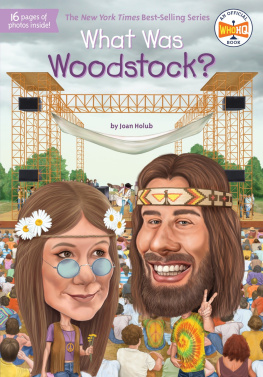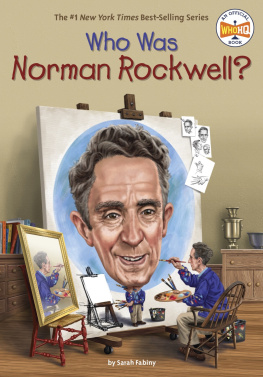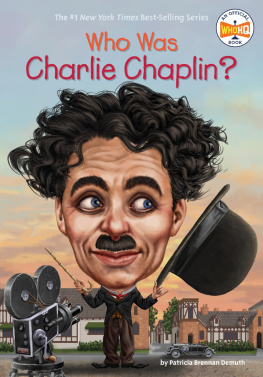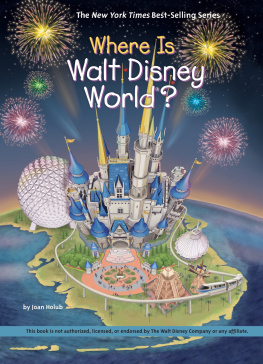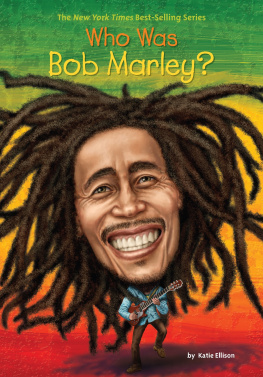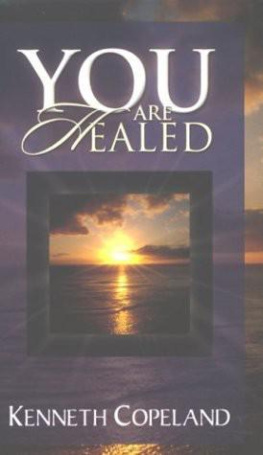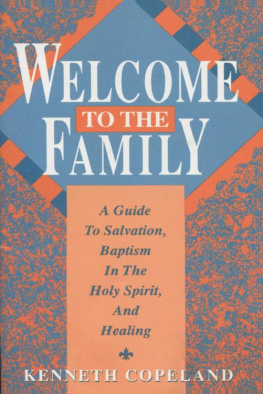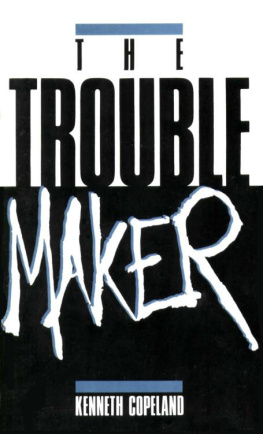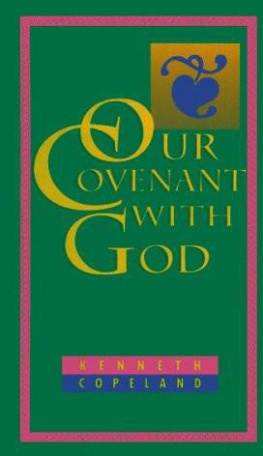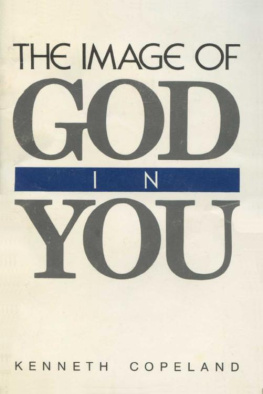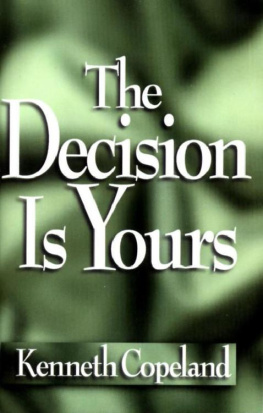Gregory Copeland - What Was Woodstock?
Here you can read online Gregory Copeland - What Was Woodstock? full text of the book (entire story) in english for free. Download pdf and epub, get meaning, cover and reviews about this ebook. year: 2016, publisher: Penguin Young Readers Group, genre: Non-fiction. Description of the work, (preface) as well as reviews are available. Best literature library LitArk.com created for fans of good reading and offers a wide selection of genres:
Romance novel
Science fiction
Adventure
Detective
Science
History
Home and family
Prose
Art
Politics
Computer
Non-fiction
Religion
Business
Children
Humor
Choose a favorite category and find really read worthwhile books. Enjoy immersion in the world of imagination, feel the emotions of the characters or learn something new for yourself, make an fascinating discovery.
- Book:What Was Woodstock?
- Author:
- Publisher:Penguin Young Readers Group
- Genre:
- Year:2016
- Rating:3 / 5
- Favourites:Add to favourites
- Your mark:
- 60
- 1
- 2
- 3
- 4
- 5
What Was Woodstock?: summary, description and annotation
We offer to read an annotation, description, summary or preface (depends on what the author of the book "What Was Woodstock?" wrote himself). If you haven't found the necessary information about the book — write in the comments, we will try to find it.
What Was Woodstock? — read online for free the complete book (whole text) full work
Below is the text of the book, divided by pages. System saving the place of the last page read, allows you to conveniently read the book "What Was Woodstock?" online for free, without having to search again every time where you left off. Put a bookmark, and you can go to the page where you finished reading at any time.
Font size:
Interval:
Bookmark:
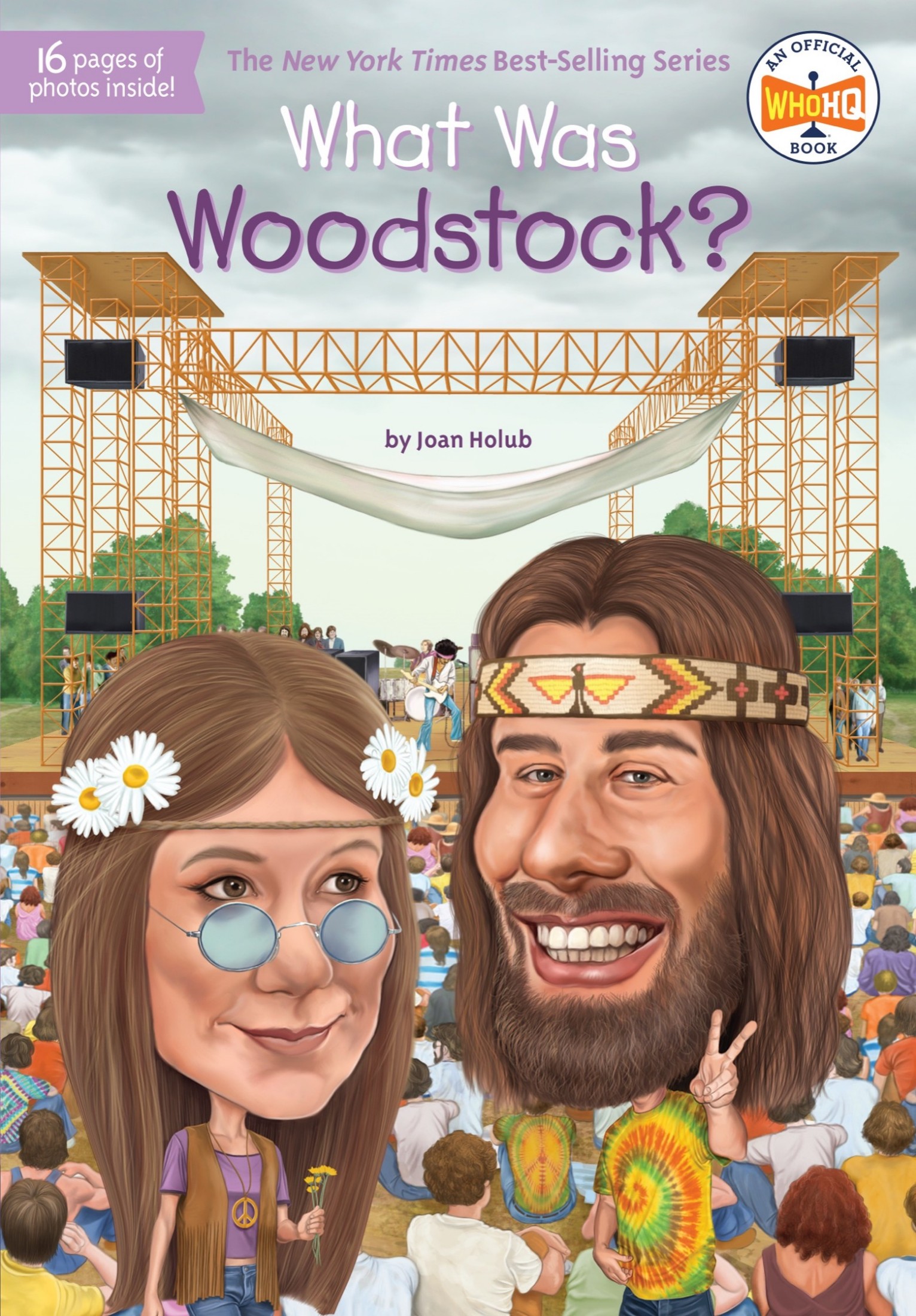
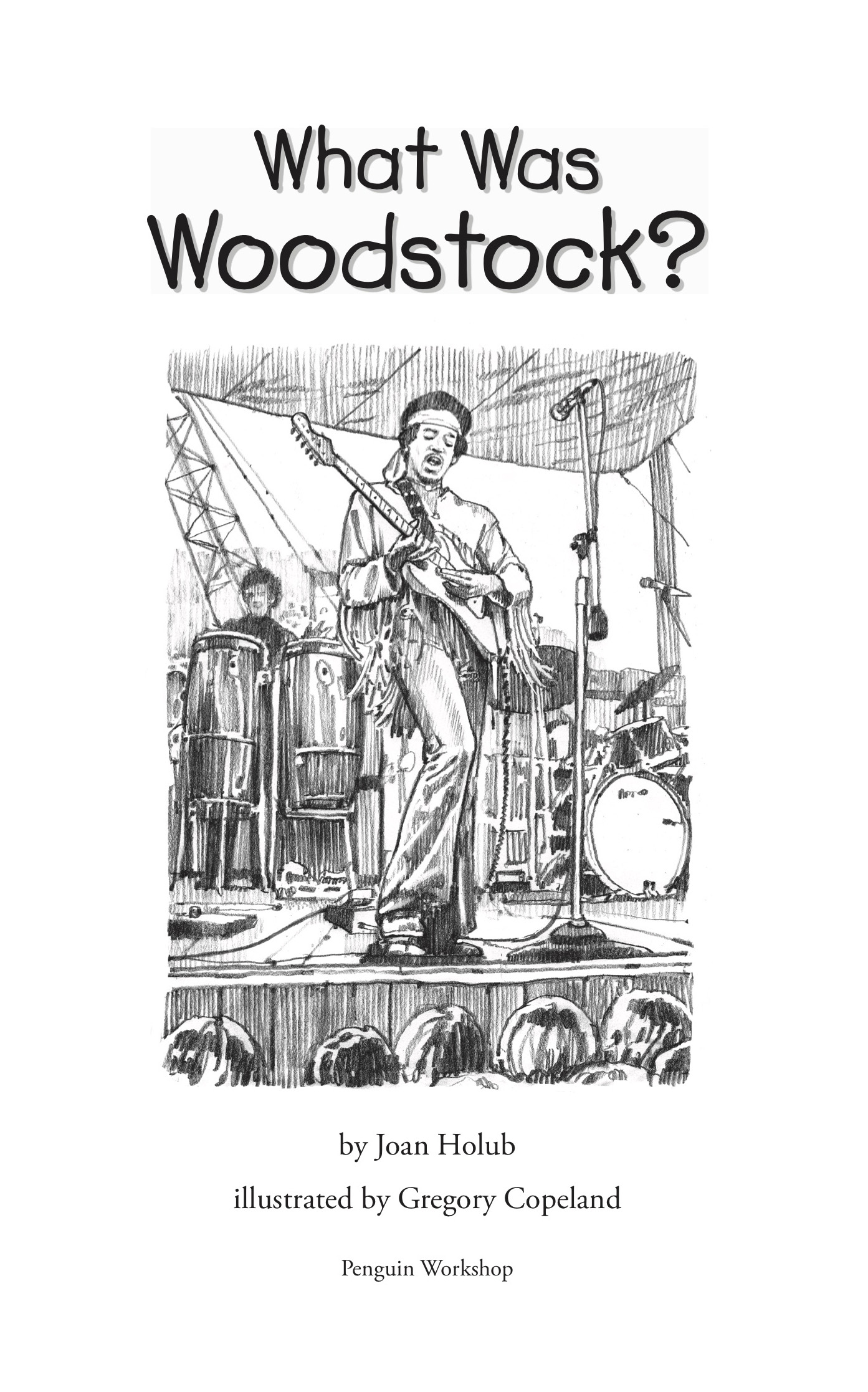
PENGUIN WORKSHOP
An Imprint of Penguin Random House LLC, New York

Penguin supports copyright. Copyright fuels creativity, encourages diverse voices, promotes free speech, and creates a vibrant culture. Thank you for buying an authorized edition of this book and for complying with copyright laws by not reproducing, scanning, or distributing any part of it in any form without permission. You are supporting writers and allowing Penguin to continue to publish books for every reader.
The publisher does not have any control over and does not assume any responsibility for author or third-party websites or their content.
Text copyright 2016 by Joan Holub. Illustrations copyright 2016 by Penguin Random House LLC. All rights reserved. Published by Penguin Workshop, an imprint of Penguin Random House LLC, New York. PENGUIN and PENGUIN WORKSHOP are trademarks of Penguin Books Ltd. WHO HQ & Design is a registered trademark of Penguin Random House LLC. Printed in the USA.
Visit us online at www.penguinrandomhouse.com.
Library of Congress Control Number: 2016930508
Ebook ISBN 9780399542893
Version_2

What Was Woodstock?
Woodstock was an outdoor rock festival in a small New York town. It took place over three days in August of 1969. Doesnt sound like anything so special, does it? Yet, today, so many years later, Woodstock has become part of the history of the 1960s.
About fifty thousand people were expected to come. Surprise! Ten times that many showed upalmost half a million people! No concert had ever attracted so many fans. Thirty-two of the hottest rock and folk bands performed onstage. It was a happeninghippie slang for a super-exciting event for cool people.
Woodstock could have been a disaster. The four guys in charge hardly had any experience planning a festival. And a lot did go wrong. Traffic jams for miles around blocked the way to the concert. It rained during the performances, and the electricity went out. There was not nearly enough food or water for the crowd. There werent enough bathrooms.
Sounds terrible, doesnt it? As the festival began, TV and newspapers reported that it was a great big mess. Families panicked. Were their teenagers whod gone to Woodstock safe? Some people wanted to send in soldiers to stop the festival before it really got started. They expected riots that weekend at Woodstock.
Many thought the festival would be a flop.
It wasnt. It was exactly the opposite. It was out of sight, which in the 1960s meant awesome.
The crowd at Woodstock thought the music was amazing. Many of the musicians were wowed by the good-natured crowd, too. And nearby townspeople were surprised to discover that the young fans were mostly nice and polite.
The year 1969 was an unhappy time in the United States. Many young people were angry about a far-off war in Southeast Asia. They felt misunderstood and ignored. They were looking for peace, love, and freedom. For three days, thats what they found at Woodstock.

CHAPTER 1
A Concert
It was the 1960s. Hip musicians like Bob Dylan were moving to Woodstock, New York. It was a pretty town with trees and farmland, about 120 miles north of New York City.


A twenty-four-year-old music promoter named Michael Lang got an idea. Maybe he should build a recording studio in Woodstock. Musicians from nearby could record their songs in his studio instead of driving all the way into New York City. And running a studio would be fun!
Lang was a hippie with big ideas and confidence. Although a bit shy, he was good at talking people into things. He tried to get someone to invest money in his recording studio.
In November 1968 he met Artie Kornfeld. Kornfeld was a vice president at Capitol Records. He wasnt sold on Langs idea. Also, he didnt have enough money for the project. But Kornfeld knew lots of bands and people in the music industry. The two men ended up hanging out together and became friends.

While playing pool, they came up with a new idea. Wouldnt it be groovy to have a big outdoor concert in Woodstock? They could sell tickets and use the money to pay for building a recording studio!
In February 1969, Lang and Kornfeld met two businessmen named Joel Rosenman and John Roberts. They were willing to investput money of their ownin cool ideas.
Rosenman and Roberts didnt know much about hippies like Lang and Kornfeld. They had already invested in building a recording studio in New York City. So they werent interested in the idea of another studio. Not at first. But then Lang and Kornfeld mentioned their Woodstock concert idea. That caught the businessmens attention. A big concert could be a moneymaker and would be great promotion for the recording studio before it was even built.
Rosenman and Roberts thought it over. They were in! The four menall in their twentiesformed a company called Woodstock Ventures Incorporated. Their event would be called the Woodstock Music and Art Fair. Soon people would begin calling it the Woodstock Festival or simply Woodstock, for short.

Planning started for a concert with an audience of fifty thousand. The date was set for August 1517. First off, they needed to pick an outdoor site. Locations in the town of Woodstock turned out to be too small. They went looking for a bigger site in towns nearby. They wanted someplace pretty, with grass and trees.
They would also need security guards, toilets, food, water, a stage, and lighting. And, oh yeah, music! Bands had to be hired. Their hope was that all the top singers and groups would sign contracts to play at their festival. A timeline and to-do lists were made. It was a lot to organize.
The team of four started out with high spirits, high hopes, and big plans. They just knew their concert was going to be outta sight!

Hippies
The hippie movement began in the 1960s. The word comes from hip as in cool. Most hippies were in their teens and twenties and came from ordinary families. Hippies were all about peace and love, and were against war. They rejected many of their parents ways, beliefs, and music.
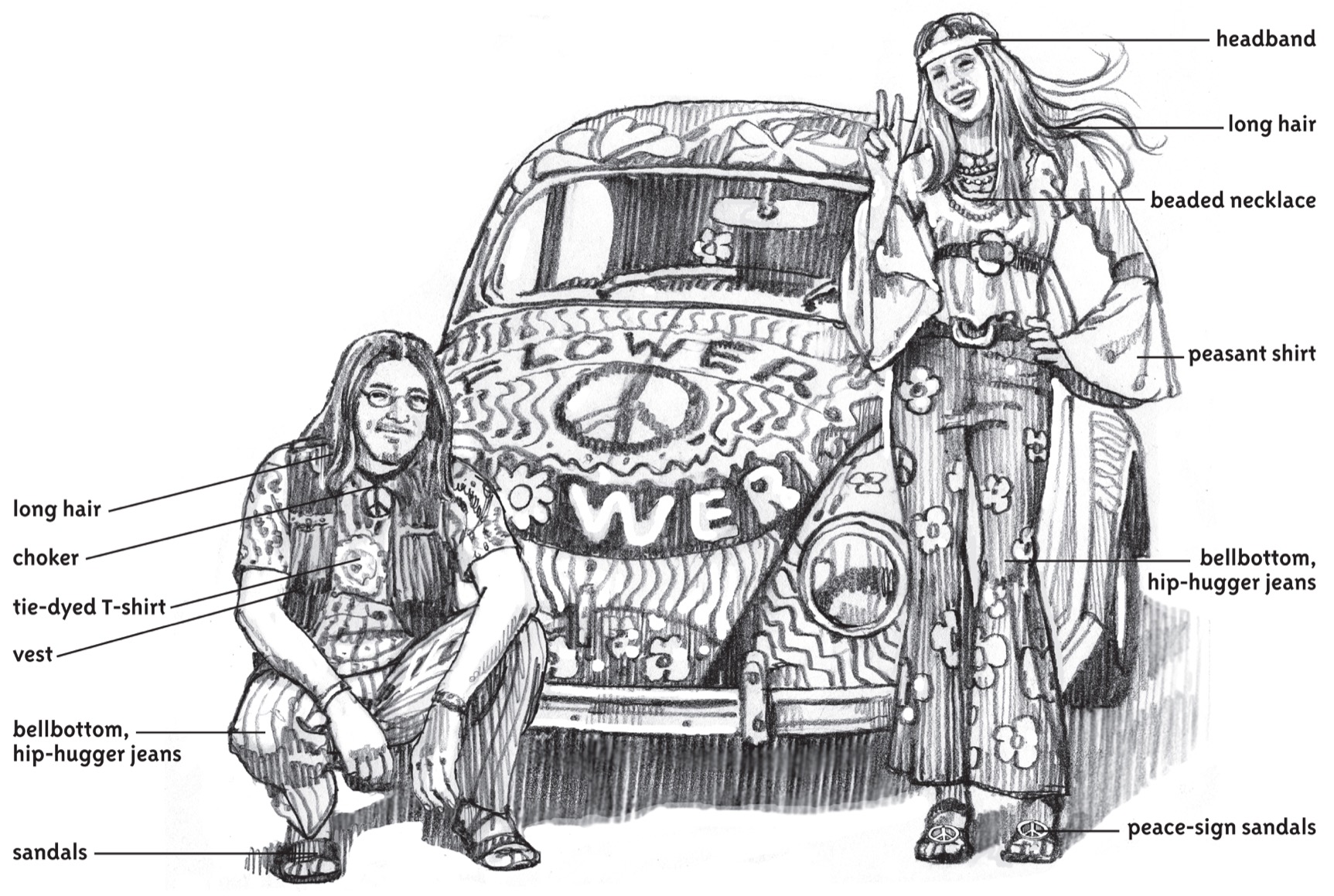
Font size:
Interval:
Bookmark:
Similar books «What Was Woodstock?»
Look at similar books to What Was Woodstock?. We have selected literature similar in name and meaning in the hope of providing readers with more options to find new, interesting, not yet read works.
Discussion, reviews of the book What Was Woodstock? and just readers' own opinions. Leave your comments, write what you think about the work, its meaning or the main characters. Specify what exactly you liked and what you didn't like, and why you think so.

